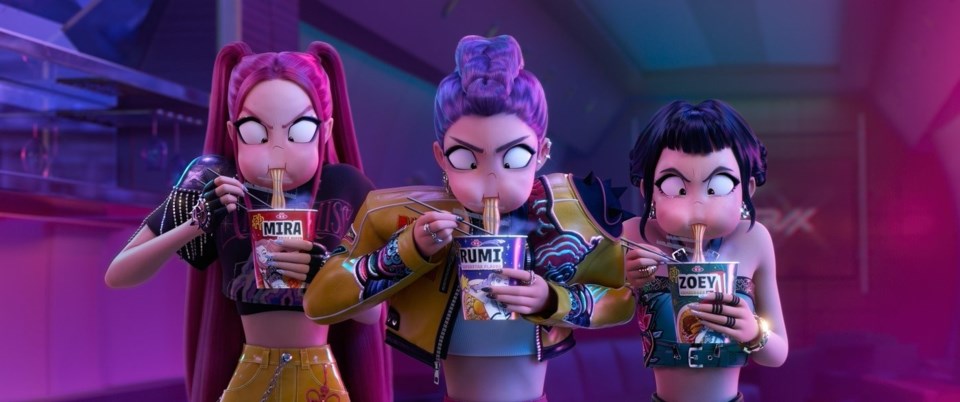Growing up as a Korean immigrant in 1990s Toronto, Maggie Kang kept her love of K-pop to herself.
“I remember hiding my K-pop albums from my white friends because they thought it was weird and silly,” recalls Kang, who moved from Seoul to Canada at age five and was raised in the North York area.
“But I was like, ‘No, this is great.’”
In a neighbourhood with few other Koreans, she rarely saw her culture reflected around her.
Now, she’s helping amplify it worldwide.
Her debut animated film “KPop Demon Hunters” — produced by Sony Pictures Animation and released by Netflix — has become a global smash, pulling in massive streaming numbers while its songs top Billboard charts.
Last week, Netflix said the musical fantasy — which follows a K-pop girl group that moonlights as demon slayers — was the first of its original movies to hit a new viewership peak in its fifth week. Its soundtrack also became the highest-charting of the year, peaking at No. 2 on the Billboard 200 in mid-July.
“It’s pretty wild. You don't ever know what the reaction is going to be, really, when you're making these things,” Kang says in a video call from Los Angeles.
“We were very hopeful it would find its audience. It feels like it has and they really latched onto it. Now it’s spreading to other areas that we didn't think it was going to get to…. We're very happy and excited and overwhelmed.”
Written and co-directed by Kang, “KPop Demon Hunters” centres on K-pop trio Huntr/x — pronounced "Huntrix" — who fight demons by night and dominate charts by day. When band members Mira, Zoey and Rumi face off against demon boy band the Saja Boys, Rumi is forced to confront her true identity.
“I think the themes of hiding parts of yourself and being afraid to show your true self to people, these days they’re more relevant than ever,” Kang reflects.
“We tend to hide behind our online personas as well, and so I think even young kids can resonate with that.”
Kang studied animation at Sheridan College and was recruited to DreamWorks in her third year, working as a story artist on films including 2011’s “Puss in Boots” and 2016’s “Kung Fu Panda 3.”
When the opportunity came to direct her own film for Sony, she knew she wanted to tap into her roots.
"I was like, 'Okay, let me think of something that's Korean because I haven't seen that before," says Kang, who spent her summers back in Korea growing up.
She considered exploring Korean mythology and demonology, but also had another concept involving K-pop.
“My husband was like, ‘Why don't you just put those together?’” she says.
“Oddly, it really fit — the idea of using music to fight demons naturally tied into Korean shamanism.”
The animation production was largely handled by Sony Pictures Imageworks studios in Vancouver and Montreal, which played a key role in crafting the vibrant, high-octane visuals.
Kang says she and co-director Chris Appelhans didn’t just want the music by their fictional groups to be part of the soundtrack — it had to be deeply integrated into the story.
It also had to slap.
“We knew the music had to stand on its own and be able to compete with all the pop songs out there, because K-pop is so good,” she says.
They enlisted a powerhouse team of producers, including The Black Label co-founder Teddy Park, known for shaping the sounds of Blackpink and Taeyang; BTS collaborators Lindgren, Stephen Kirk, and Jenna Andrews; and Ian Eisendrath, who worked on Broadway hit “Come from Away.”
“Our songs had to be bops, but they also had to tell a story,” says Kang.
“That added another layer of challenges to the songwriting.”
Their work hit all the right notes. This month, Huntr/x’s “Golden” became the first track by a fictional act to top the Billboard Global 200 — edging out summer hits such as Alex Warren’s “Ordinary” and Justin Bieber’s “Daisies."
Meanwhile, Saja Boys’ “Your Idol” hit No. 1 on the U.S. Spotify chart, surpassing BTS as the highest-charting male K-pop act in the platform’s history.
“We needed the music to be chart-topping … but now to see it happen is like, ‘Whoa, what is happening?’” Kang says.
“I don’t think I ever really thought that it was going to happen.”
Kang says she’d “definitely” consider expanding the “KPop Demon Hunters” universe.
“There's a lot of unanswered questions and a lot of undeveloped ideas in the movie that we had to omit because of length. I know fans really want the fuller backstories of Mira and Zoey, and we did put those in at one point, but ultimately, this movie was a story about Rumi, so we had to take it out,” says Kang.
“We have a lot to show still.”
But for now, she’s taking a moment to soak it all in: the love, the milestones and the cultural shift she once didn’t think she’d ever see.
“I feel very proud, just seeing Korean culture being in the spotlight. I never thought this would happen,” she says.
“As somebody who grew up when Korea wasn't that cool, to see it come this far is really amazing.”
This report by The Canadian Press was first published July 29, 2025.
Alex Nino Gheciu, The Canadian Press



